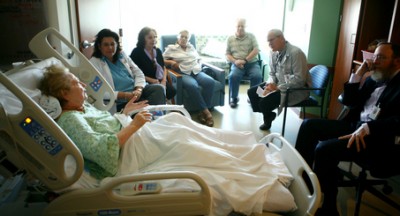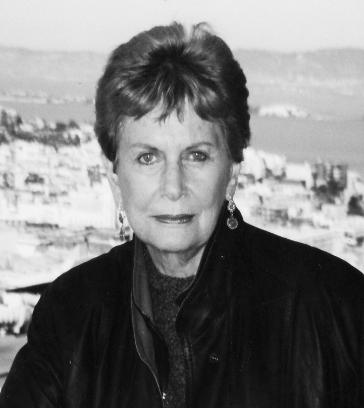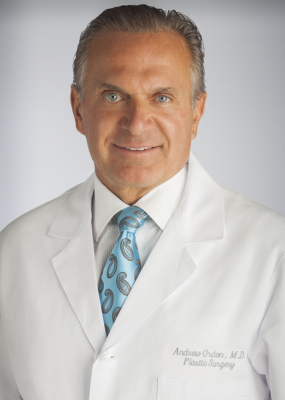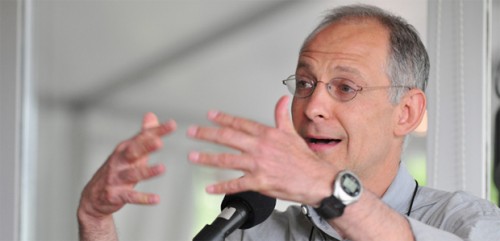By Aaron Corvin
Hospitals are supposed to be places of healing, but Washington’s hospitals are becoming places of conflict between religion and government over health care services.
 The state’s American Civil Liberties Union is questioning whether health care regulatory agencies and public hospital districts should grant approval to faith-based hospitals — primarily Catholic — that don’t offer reproductive and end-of-life services that are widely available at secular hospitals. In some rural areas of the state, the ACLU says, hospital consolidations and mergers could leave communities only with Catholic hospitals which refuse, based on Catholic religious beliefs, to provide such services.
The state’s American Civil Liberties Union is questioning whether health care regulatory agencies and public hospital districts should grant approval to faith-based hospitals — primarily Catholic — that don’t offer reproductive and end-of-life services that are widely available at secular hospitals. In some rural areas of the state, the ACLU says, hospital consolidations and mergers could leave communities only with Catholic hospitals which refuse, based on Catholic religious beliefs, to provide such services.
“We’re very troubled by what’s going on,” said Sarah Dunne, legal director for the Seattle-based American Civil Liberties Union of Washington Foundation. The ACLU is pressing its case on several fronts, including the possibility of legal action. The group also is challenging proposed partnerships between Vancouver-based PeaceHealth and other health care providers.
PeaceHealth, a Catholic-sponsored health system, is pushing back. The nonprofit health care giant — Clark County’s top private employer — says its partnerships with public hospital districts and others are well within legal parameters. And the organization stands by its right to deny certain services based on its religious principles, officials say, as it continues a long history of improving health care in a variety of communities.
“All we have to point to is our record of service,” said Jenny Ulum, a PeaceHealth spokeswoman.
Later this year, the proposal by PeaceHealth and Colorado-based Catholic Health Initiatives to join forces will undergo a public review and decision by state health regulators. The companies are submitting paperwork, and critics say they plan to weigh in.
The controversy arises amid dizzying political and economic changes in health care. Consolidation has become a health care industry norm. And federal health care reform has heightened tension between the Obama administration and Catholic-based health providers over insurance coverage for contraception.
Not all religiously affiliated hospitals operate in the same way or with the same policies. In PeaceHealth’s case, the nonprofit is a church ministry authorized by the archbishops of Portland and Seattle, according to Ulum. “The church’s authority pertains to our Catholic identity,” she said, “which basically has oversight over faith and morals.” However, PeaceHealth also is a nonprofit corporation with its own governing board and bylaws, Ulum said. PeaceHealth owns its property and facilities, she said, and is responsible for business operations and its health care work.
Legal arguments clash
The ACLU cites data showing that several merger proposals this year would decrease secular hospital beds in the state, in some cases handing a monopoly on health care services to religiously affiliated institutions.
As a result, the ACLU in Washington has launched efforts to curb what it sees as an alarming trend. That includes opposing arrangements between PeaceHealth and taxpayer-funded public hospital districts in San Juan and Skagit counties. The group argues the tax dollars should not be used to subsidize health services limited by PeaceHealth’s religious policies.
It’s also urging public hospital officials to renegotiate their relationships with PeaceHealth in light of the nonprofit’s proposed partnership with Catholic Health Initiatives.
The ACLU argues CHI is even more restrictive in its policies than PeaceHealth. Partly because of its larger size and influence, they say, CHI will likely seek to impose its religious doctrines in communities served by PeaceHealth.
But PeaceHealth officials say the nonprofit and CHI already have agreed that neither of their respective patient-care ethical policies will change under their proposed affiliation, which will be structured as an equal partnership. What’s more, they say, their partnership is intended to boost the quality of care they provide and to strengthen their financial footing to serve growing populations.
The situation in San Juan County exemplifies the conflict. Under an arrangement with the San Juan County Public Hospital District No. 1, PeaceHealth built Peace Island Medical Center, which opened last year. The new facility was built for $30 million, with the community covering about a third of the cost using private funds and with PeaceHealth footing the rest of the construction bill. And PeaceHealth runs the hospital under a contract with the district, which uses its property-tax levy to partially subsidize PeaceHealth’s operations.
Ulum, the PeaceHealth spokeswoman, said the hospital district transferred about $1.2 million in annual property-tax revenue it had used to operate its previous clinic to PeaceHealth. Nearly all of those property-tax dollars enable PeaceHealth to cover the costs of providing charity care and of maintaining a 24-hour emergency department, Ulum said. There was no change in the tax rate, she added.
Lenore Bayuk, the San Juan Hospital District’s commission chairwoman, said PeaceHealth’s entry into the community, with modern facilities, was crucial. Previously, the district struggled to cover its costs at the old clinic, Bayuk said. With PeaceHealth, she said, the district is on sounder financial footing. “We have a cancer treatment center which we didn’t have before,” Bayuk added, noting many other improvements.
But critics say the situation isn’t so tidy. Those include Monica Harrington, a former Seattle technology executive who opposes PeaceHealth’s contract with the San Juan County public hospital district. She cited the fact that San Juan County health officials have agreed to review concerns raised by some residents about health care cost and access issues, including at Peace Island Medical Center.
“We effectively traded lower-priced unrestricted health care in an increasingly dilapidated building for much, much higher-priced, religiously restricted care in a beautiful, art-filled facility,” Harrington wrote in an email to The Columbian.
The ACLU acknowledges the improvements made under PeaceHealth’s arrangement with the San Juan Hospital District. But the organization argues the contract between PeaceHealth and the district violates the Washington Constitution and the state’s Reproductive Privacy Act. “As a government entity, the hospital district should not subsidize religious facilities that discriminate against women’s fundamental rights,” Kathleen Taylor, executive director of the ACLU’s operation in Seattle, wrote in a letter to district officials.
PeaceHealth says the ACLU is wrong in its legal interpretation. There’s nothing in the law prohibiting public-private partnerships between hospital districts and private health care providers that maintain religious affiliations, the nonprofit says. The purpose of PeaceHealth is to provide “important health care services, not the advancement of religion,” according to its legal analysis. “To suggest otherwise is inconsistent with more than a century of collaboration in Washington between the state and religiously affiliated charities, health providers and others.”
But the ACLU says its concerns go beyond PeaceHealth’s arrangements with local public hospital districts.
In her letter to the San Juan County Hospital District, Taylor takes umbrage with PeaceHealth’s proposed partnership with CHI, which operates in 17 states and includes 78 hospitals. The venture between PeaceHealth and CHI would combine seven Catholic Health Initiatives hospitals in Washington and Oregon with nine PeaceHealth hospitals in Washington, Oregon and Alaska.
Although PeaceHealth has argued it will maintain its own ethical policies in its relationship with CHI, Taylor wrote in her letter, “the lack of any legally binding document to that effect fails to protect against the possibility” of additional restrictions on access to reproductive and end-of-life services.
In their concern about how PeaceHealth and CHI will interact, the ACLU and other critics also cite Kentucky Democratic Gov. Steve Beshear’s effort last year to block a proposed merger between University of Louisville Hospital and Catholic Health Initiatives. Beshear opposed the merger in part out of concern that the deal would reduce access to reproductive services. But after further negotiations, the deal went through this month and included a provision that U of L Hospital will remain independent of the Catholic health directives followed by CHI.
Closer to home, PeaceHealth says the concern about its potential relationship with CHI is a nonstarter.
In a letter to the San Juan County hospital district, Sister Andrea Nenzel, chair of PeaceHealth’s board, wrote: “(Catholic Health Initiatives) and PeaceHealth have already agreed that our hospitals, including Peace Island Medical Center, will not change their ethical policies regarding patient care that have been in effect for as long as 40 years.”
Diverging from mainstream?
PeaceHealth officials emphasize the nonprofit’s health care mission is spiritual and expansive, serving the poor and caring for those who are unable to pay for services. Its faith foundation means that PeaceHealth also carries a set of ethical policies that govern the medical services it chooses to provide. Those include:
• It does not permit abortion except to save the life of the mother.
• Contraceptive decisions, including tubal ligations and vasectomies, are between the patient and the provider, and are based on medical necessity.
• Emergency contraception is provided to women who are victims of sexual assault. However, PeaceHealth requires a negative pregnancy test before it will dispense emergency contraception.
• RU-486, which induces abortion, is not dispensed at PeaceHealth.
• With respect to end-of-life care, the nonprofit honors advance directives.
• Physician-assisted suicide is prohibited — even in states, including Washington, where it is legal — on PeaceHealth time and in the nonprofit’s facilities or any facility leased from PeaceHealth.
“In the vast majority of cases,” said Ulum, the PeaceHealth spokeswoman, there’s no “dogmatic policy that supersedes” the decision-making that goes on between a doctor and a patient.
Before Vancouver-based Southwest Washington Medical Center became part of PeaceHealth’s system in 2010, the hospital had been secular since the late 1960s, according to Ken Cole, a PeaceHealth spokesman. Still, the secular hospital honored its Catholic heritage, which dates to the hospital’s founding in 1858 by Mother Joseph of the Sacred Heart.
None of the ethical policies that Southwest, as a secular institution, followed in providing medical services changed when the hospital joined the Catholic-sponsored PeaceHealth network, according to Cole. “We were already in alignment with the system,” he said.
Of course, both organizations have made numerous other changes to solidify their affiliation, Cole said, including updating their clinical procedures.
‘Our conscience’
But critics see more gaps, “don’t ask, don’t tell” situations and slippery slopes in the policies of PeaceHealth and other religiously based health care companies than they do comprehensive services. And they cite examples in Puget Sound and across the nation where they believe that religiously based policies have interfered with patient rights and needs, and modern medicine.
“Who wants their doctor worrying about what a bishop thinks in the middle of a medical emergency?” said Harrington, the critic of PeaceHealth’s contract with the San Juan County public hospital district.
Harrington leads the Coalition for Health Care Transparency and Equity — the group arguing against the arrangement in San Juan County. She’s also co-chair of Washington Women for Choice.
Harrington has weighed in on issues of choice and access in a variety of ways, including submitting op-ed columns in the San Juan Islander newspaper. In one column, she wrote that she’s had “dozens of conversations with people who’ve had terrible experiences because of religious doctrine — from the doctor whose career was threatened as she worked to honor the wishes of a dying patient to a woman who found herself feeling abandoned and alone at Swedish (Medical Center in Seattle) with a midterm pregnancy that needed to end for her health and safety. Rarely do people feel comfortable speaking publicly.” Swedish entered into an affiliation with Providence Health & Services last year.
Harrington grew up in a Catholic family but said she has left the Catholic Church. The church’s view of health care “is diverging from mainstream health care,” she said, “and the people who are most at risk are reproductive-age women and people at the end of life.”
When asked whether the ACLU was girding for a lawsuit, Dunne said the group is exploring all of its options. For now, it continues to research the issue, including asking patients and medical providers to take a confidential survey intended to pinpoint cases in which health services have been denied on religious grounds.
For its part, PeaceHealth says it’s focused on its mission to expand services and deliver improved care to the populations it serves. “I don’t think there’s a lot of disagreement over the positive contribution (the) hospital is making,” said Ulum, the PeaceHealth spokeswoman. And PeaceHealth’s policies against providing certain services, Ulum said, are based on “our conscience as an organization.”
Complete Article HERE!








